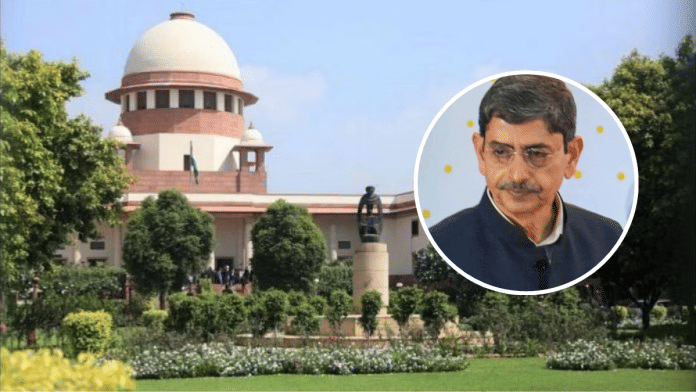New Delhi: A Governor does not have absolute power to sit over bills sent by a state assembly, the Supreme Court held Tuesday, deeming Tamil Nadu’s Governor R.N. Ravi’s withholding of assent for 10 bills as “illegal and erroneous”.
This landmark ruling by the bench comprising Justices J.B. Pardiwala and R. Mahadevan reshapes the scope of the Governor’s authority, particularly in situations where Centre-state relations are politically tense.
In addition to Tamil Nadu, the states of Kerala, Telangana, and Punjab also approached the Supreme Court seeking its intervention in what they saw as an undemocratic use of power by the Raj Bhavan, potentially affecting governance and legislative processes.
ThePrint looks at how the SC ruling has set clear limits to gubernatorial powers by outlining timelines in withholding bills, and how non-BJP states have had frequent disagreement with the Raj Bhavans.
Constitutional role of Governor
Article 200 of the Constitution specifically deals with the issue of granting assent to Bills. “When a Bill has been passed by the Legislative Assembly of a State or, in the case of a State having a Legislative Council, has been passed by both Houses of the Legislature of the State, it shall be presented to the Governor and the Governor shall declare either that he assents to the Bill or that he withholds assent therefrom or that he reserves the Bill for the consideration of the President,” it reads.
The key clause here being that the Governor “may, as soon as possible” return any Bill—except a money Bill—with a message suggesting that the House reconsider it, either in full or in part.
Once the Legislative House reconsiders the Bill and sends it back, the Governor “shall not withhold assent”. Though it reinforces democratic accountability, it doesn’t give any stipulated timeline for the governor to give assent.
After taking note of Tamil Nadu’s submission against Ravi’s repeated delays and refusals to assent to 10 Bills, the top court established a timeline for granting assent to address the increasing trend of deliberate inaction by Governors.
“Keeping in mind the constitutional significance of Article 200 and the role it plays in the federal polity of the country, the following timelines are being prescribed. Failure to comply with the timelines will make the action of the Governor subject to judicial review,” the court observed.
The Governor will have a maximum period of 1 month to withhold assent or reserve a Bill for consideration of the President. The Bill must be returned to the legislature within three months if the Governor withholds assent contrary to the advice of the Council of Ministers.
Similarly, the Governor has three months if the Bill is to be reserved for consideration of the President. Also, the Governor will have to give assent within a month in case the Bill is sent back for re-consideration by the state Assembly.
Kerala finds vindication in SC ruling
The Left Democratic Front (LDF) government had informed the Supreme Court in November 2023 that eight Bills have been pending with Kerala Governor Arif Mohammad Khan for a long time.
Earlier, a Public Interest Litigation (PIL) was filed in the Kerala High Court on the same issue but the court chose not to intervene
“There were Bills that remained with the Governor for 13, 16, even 18 months. We had said publicly that such delays were undemocratic. The Governor is expected to function in accordance with the advice of the elected government,” Kerala law minister P. Rajeev said, welcoming the SC decision.
Simialrly, CM Pinarayi Vijayan said the verdict upheld the federal structure and democratic rights of the legislative assemblies. “This verdict is also a warning against the trend of governors usurping the powers of the legislative assemblies and hence it’s a victory of democracy as well. We had a situation where the bills passed by the assembly were withheld for up to 23 months. We are fighting a legal battle against it,” he remarked.
Over 18-month delay in Telangana
In 2023, the erstwhile Bharat Rashtra Samithi (BRS) government had knocked the doors of the Supreme Court as the Raj Bhavan delayed assent to over 10 significant Bills.
Seven of the Bills were passed by the Telangana Assembly and sent to the then Governor Tamilisai Soundararajan as far back as September 2022.
Some of the Bills caught in cold storage are the Common Recruitment Board Bill, the Private Universities Bill, the Motor Vehicle Tax Bill, and the Agriculture University Amendment Bill.
Punjab’s run-ins with Raj Bhavan
In Punjab, the Aam Aadmi Party (AAP) government had run-ins with Governor Banwarilal Purohit over delays in granting assent to Bills and over the calling of assembly sessions.
Two years ago, Punjab had sought the Supreme Court’s intervention, arguing that the Governor was not acting as per constitutional norms, and that his inaction was obstructing the functioning of the legislature.
The litigation ended with the Supreme Court slamming the octogenarian for “playing with fire” and “putting parliamentary form of government in peril”.
Frayed tempers in Bengal
The Trinamool Congress-ruled West Bengal has seen frequent, public clashes with its Governors—first Jagdeep Dhankhar (now the vice-president of India), and later C.V. Ananda Bose.
Several Bills relating to state universities and local administrative matters passed by the West Bengal Legislative Assembly have been delayed or sent back by the Raj Bhavan.
A major area of friction has been control over public universities. In June 2022, the TMC government passed the West Bengal University Laws (Amendment) Bill to replace Governor Dhankhar with Chief Minister Mamata Banerjee as the Chancellor of all state-run universities but the latter refused to give assent, calling it “unconstitutional”.
Last year, in July, the Bengal government moved the apex court against Governor Bose for withholding assent on eight bills.
(Ruchi Bhattar is a fifth-year-law from the University of Calcutta and is interning with ThePrint)
(Edited by Tony Rai)
Also Read: How CAG is appointed & why a petition in SC has called the process unconstitutional






